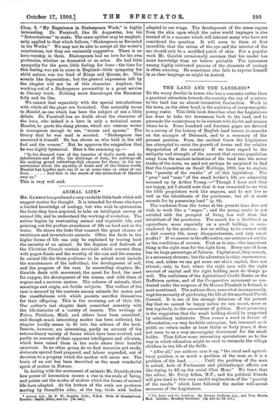THE LAND AND THE LANDLESS.*
To the weary dweller in towns who has a romantic rather than a practical attraction towards the country the cry of a return to the land has an almost irresistible fascination. Work in the town, on the other hand, is the ambition of every energetio young rustic. This little book describes what the Legislature has done to take the townsman back to the land, and to persuade the countryman to be content with his lot and remain where be is. Some hundred and fourteen pages are devoted to a survey of the history of English land tenure, to remarks on the example of Denmark, and to a summary of the present position. From the earliest times the Legislature has attempted to resist the growth of towns and the relative depopulation of the country. If we have regard to the antiquity and strength of the current that carries population away from the ancient industries of the land into the newer trades of the town, we need not perhaps be surprised to find that the Committee on Small Holdings, 1906, has to explain the "paucity of the results" of all this legislation. The " pros " and "cons" of the small holder's life are admirably summed up by Arthur Young :—" Though I have said they are happy, yet I should note that it was remarked to me that the little proprietors work like negroes, and do not live so well as the inhabitants of the poorhouse; but all is made amends for by possessing land" (p. 84).
The workman from the towns at the present time does not wish to work like a "negro " ; and the young rustic is not satisfied with the prospect of living less well than the inhabitant of the poorhouse. The search for a livelihood in agriculture, more especially on a small holding, is over- shadowed by the question : Are we willing to be content with a dull country life, many disappointments, and very small profits ? If we answer in the affirmative, our authors set out for us the conditions of success. First as to size,—the important thing is the right man for the right farm. Every size of farm has its large percentage of failures. Capital next, they remark, is a necessary element; but the adventure is risky, unremunera- Live, and, unless we can get some one else's capital, does not attract; only, in fact, where the right man with the right amount of capital and the right holding meet do things go well. The usefulness of the Agricultural Credit Banks on the Raffeison system, and of the Co-operative movement as con- ducted under the auspices of Sir Horace Plunkett in Ireland, is next mentioned. The authors then, somewhat incongruously, urge the necessity of quickening the life of the moribund Parish Council. It is one of the strange delusions of the present day that we cannot be happy unless we can resort, more or less regularly, to the amusement of politics. More promising is the suggestion that the small holding should be supported by subsidiary industries: Then comes a word in favour of afforestation,—a very laudable enterprise; but, inasmuch as it yields no return under at least thirty or forty years, it does not seem to us a very encouraging investment for the small holder. Then follow some interesting speculations as to the way in which education might be used to reconcile the village children to the life of the fields.
"After all," our authors sum it up, "the rural and agricul- tural problem is as much a problem of the man as it is a problem of the land Until the problem of the man is solved, Acts of Parliament and philanthropic efforts are like trying to fill up the social Chat Moss." We trust that the editor, Mr. Percy Alden, M.P., and his political friends will give heed to this very candid explanation of the "paucity of the results" which have followed the earlier well-meant measures of the Legislature.
• The Land and the LandLeu. By George Cadbury. jun.. and Tom Bryan, M.A. London : Headley Brothers. [1s. and le. 6d. net.]














































 Previous page
Previous page